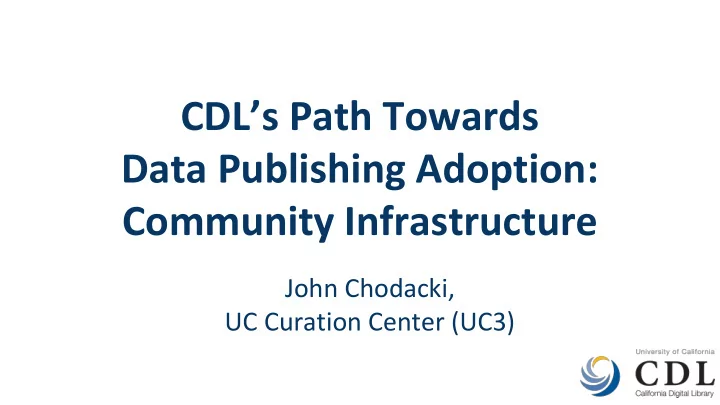

CDL’s Path Towards Data Publishing Adoption: Community Infrastructure John Chodacki, UC Curation Center (UC3)
Looking Inward: Self Assessment
Last year... Institutions build or buy general data repositories (a.k.a. data IRs, non-domain data repositories, campus data solutions)
What we learned Tools are not researcher centric Focus on tools has distracted community from our adoption efforts Researchers do not think at the institutional level We have to meet researchers where are they are at within their workflows
Evaluating Our Success ❌ # of Deposits ❌ Awareness in the researcher community ❌ Integration into workflows ❌ Simplified story of value proposition
Meanwhile.... 1. Commercialization of this space continues 2. Research data services/investments are unaffordable with library budgets 3. Researchers have continued to deposit where publishers refer them 4. Our focus, rightly so, has been on community infrastructure for articles
Community Infrastructure
Principles for Open Scholarly Infrastructures Bilder G, Lin J, Neylon C (2015) Principles for Open Scholarly Infrastructure-v1, http://dx.doi.org/10.6084/m9.figshare.1314859
Supporter Community Values 6. Respect multiple solutions 7. Stick to your scope 8. Leverage communal wisdom to move quickly 9. Encourage healthy skepticism 10. Collaborate and be stronger together Full book available: supporters.guide - @supportersguide
Effective support to the research community does not always mean building new or more tools
Looking Outward: Community Success
Dryad ● Researcher supported and adopted ● Curation for FAIR data & compliance on every dataset ● Embedded in researchers workflows ● Open source & non-profit
Dryad: leader in open data publishing 90,000 researchers 24,500 data submissions 2100 international institutions 700+ academic journals represented Curation checks on every submission
We Are Launching a New Dryad Service! ★ New product development team ★ Migrating classic Dryad onto open-source, nimble CDL technology ★ Transparent reporting and curation with administrative layer ★ Enhanced submission features: publisher integrations
We are launching a new community model ● Dryad is building an institutional membership community ● Dryad will be supporting a new set of institutional features ● Institutions can support curated research data publishing where researchers are already depositing
Our Values
We are researcher centered
We are adoption focused
Call to Action
We are an institutional community who support data curation, data publishing, and data preservation adoption. We should effectively band together and support community-owned research data infrastructure!
It is not about technology. It is about meeting researchers where they are at and building global, sustainable, centralized approaches to achieve adoption.
Values translated to features
New Dryad Platform ❏ Leverages a Core Trust Seal Certified Preservation Repository ❏ Technology is standards-based: ❏ SWORD, OAI-PMH, Schema.org ❏ DataCite schema, ORCiD login/co-author ORCiDs, Funder Registry, Versioning ❏ Large datasets accepted via cloud manifest ❏ Submission and Download APIs ❏ Administration and curation layer ❏ Standardized data usage and citation metrics (Make Data Count)
Dryad Curation ● Metadata and file checking on every submission ● Team of expert curation staff ● Plugging into institutional data curators ● Modified checks and policies enforced for publishers
Seamless Deposits
Publisher Integrations ● Deposit of data at same time as article ● Researcher never has to leave article submission system ● Privacy during peer review
Transparency & Reporting
Discoverability & Usability
Compliance
Compliance ● FAIR Data: Curation ● Funder Requirements: ○ CoreTrustSeal, FAIR Data, Preservation ● Publisher Policies: ○ Private during peer review, published alongside article, citations ● Institutional Values: [Your Input Here!]
What sets Dryad apart? ● Focus: ease of deposit and user centered ● Goal: drive adoption of curated, compliant, research data publishing ● Features: innovations to uphold our goals & values
Recommend
More recommend